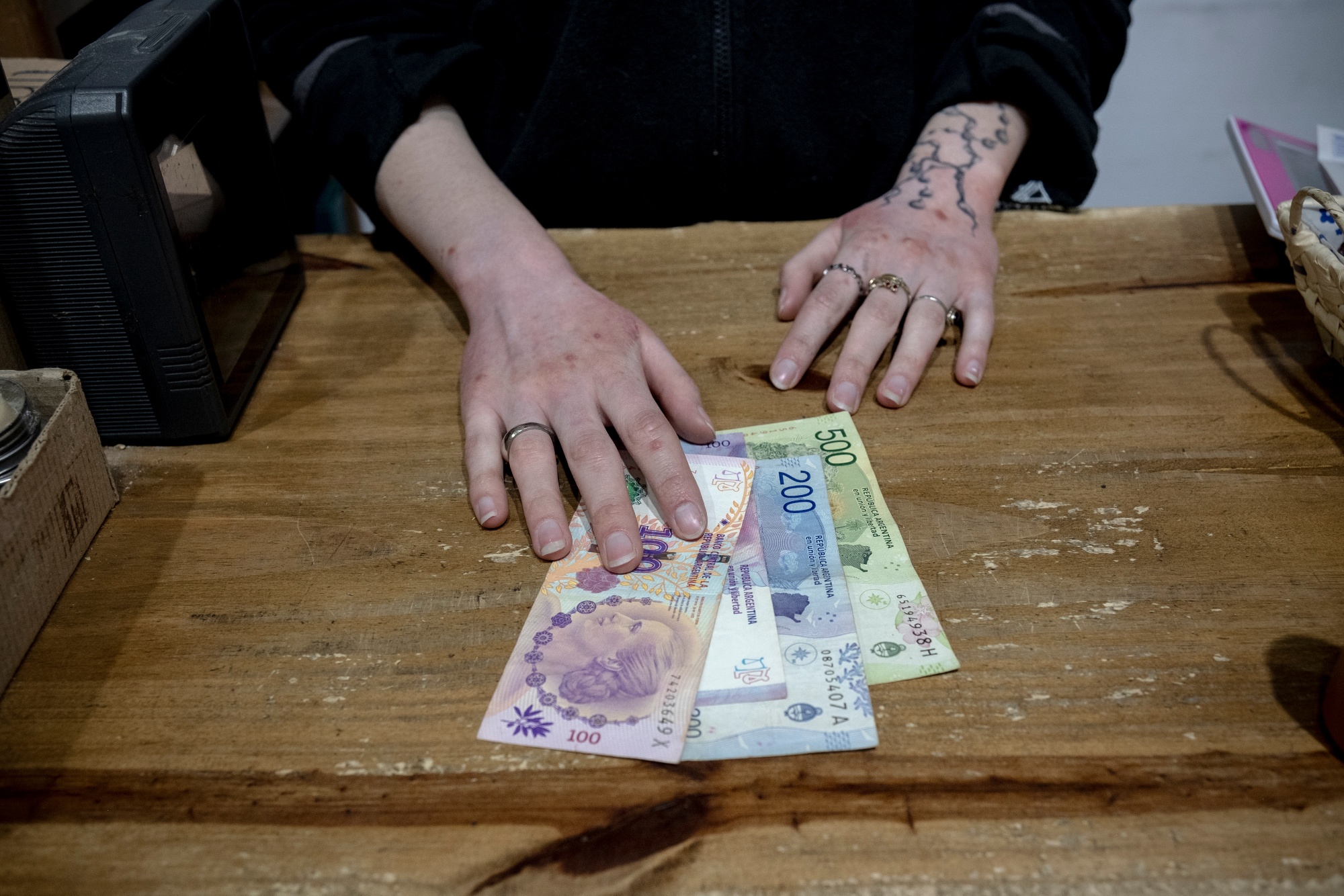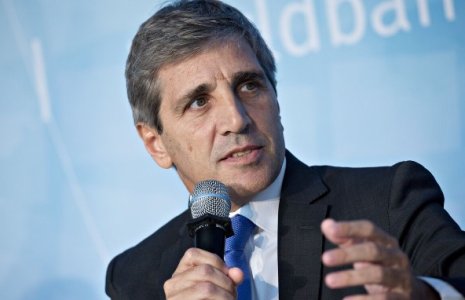earlyretirement
Moderator
Argentina's Milei Devalues Peso by 54% in First Batch of Shock Measures - Bloomberg

Argentina’s official exchange rate has been cut to 800 pesos per dollar.
Photographer: Erica Canepa/Bloomberg
By Kevin Simauchi, Manuela Tobias, and Ignacio Olivera Doll
December 12, 2023 at 3:11 PM PST
Argentina devalued the peso by 54% and announced a swath of spending cuts as the first steps of President Javier Milei’s shock-therapy program, moves welcomed by the International Monetary Fund.
The newly inaugurated administration weakened the official exchange rate to 800 pesos per dollar, Economy Minister Luis Caputo said in a televised address after the close of local markets on Tuesday. It was 366.5 per dollar before the address.

Luis CaputoPhotographer: Andrew Harrer/Bloomberg
“There is no more money,” Caputo said repeatedly in the recorded video, adding that Argentina needs to solve its “addiction” to fiscal deficits.
Other measures announced including halving the number of ministries, cutting transfers to provinces and suspending public works. The government will also reduce subsidies on transport and energy sectors, among others. At the same time, Argentina will boost certain social welfare programs, Caputo said.
The IMF praised the new government’s “bold initial actions” shortly after Caputo’s announcement. “Their decisive implementation will help stabilize the economy and set the basis for more sustainable and private-sector led growth,” spokesperson Julie Kozack said in a statement.
The dramatic first steps follow a somber inauguration speech on Sunday, when Milei warned that Argentines will have to endure months of pain while he works to pull the country from the economic crisis inherited from his predecessor. Inflation is already running at more than 140% annually, and prices are expected to jump between 20% and 40% in the months to come, the president said.
The government had closed Argentina’s export registry Monday, a technical step that often foreshadows a currency devaluation or major policy change. The central bank also announced Monday the official currency market would operate with limited transactions — a restriction it said it will lift on Wednesday.
he devaluation was long seen as inevitable. In the run-up to Milei’s inauguration, markets were signaling a currency drop of about 27% in the first week of the new government, while investment banks like JPMorgan Chase & Co. and local private advisory firms suggested it could weaken about 44%. Grocers had already increased prices and banks were offering sharply weaker retail exchange rates hours before the Tuesday announcement.
Argentine authorities have for years slowed the peso’s decline in the official market through currency controls and import restrictions in an attempt to protect dwindling reserves. That hodgepodge of capital controls has spurred at least a dozen exchange rates, hampering business and restricting investment in South America’s second-largest economy. On the campaign trail, Milei pledged to scrap the currency altogether, replacing it with the US dollar.
“We’re always worse off because our response has been to attack the consequences but not the problem,” Caputo said in his address. “What we’ve come to do is the opposite of what they always did, and that’s solve the root problem.”
On Dec. 7, the prior administration had let the peso slip by about 5%, while simultaneously limiting the amount of greenbacks banks could hold in order to prevent them from hoarding dollars. The government had been burning reserves to keep the currency largely steady at 350 per dollar since the August primary vote, when Milei’s surprise showing sent markets into a tailspin. In parallel markets, that rate is about 1,000.
Since being spooked by his emergence in the August primary, investors have changed tack on the firebrand libertarian, cheering on his first steps as president-elect — namely, his decision to pick Wall Street veterans for some of the main cabinet positions while distancing himself from more radical proposals including dollarizing the economy and shuttering the central bank. As he begins his four-year term, the rally will be put to the test.
Caputo previously served as finance chief in the administration of Mauricio Macri, when he negotiated a $16.5 billion deal with holdout bondholders, allowing Argentina to return to international capital markets. Amid a currency run in 2018, Macri tapped him to take over at the central bank, but he only served for a few months before unexpectedly stepping down amid tensions with the IMF.
Caputo has tapped longtime colleague Santiago Bausili, a Deutsche Bank and JPMorgan Chase & Co veteran, to run Argentina’s central bank.
— With assistance from Davison Santana and Patrick Gillespie
- IMF hails ‘bold initial actions’ to stabilize reeling economy
- Milei administration lets official rate fall to 800 per dollar

Argentina’s official exchange rate has been cut to 800 pesos per dollar.
Photographer: Erica Canepa/Bloomberg
By Kevin Simauchi, Manuela Tobias, and Ignacio Olivera Doll
December 12, 2023 at 3:11 PM PST
Argentina devalued the peso by 54% and announced a swath of spending cuts as the first steps of President Javier Milei’s shock-therapy program, moves welcomed by the International Monetary Fund.
The newly inaugurated administration weakened the official exchange rate to 800 pesos per dollar, Economy Minister Luis Caputo said in a televised address after the close of local markets on Tuesday. It was 366.5 per dollar before the address.

Luis CaputoPhotographer: Andrew Harrer/Bloomberg
“There is no more money,” Caputo said repeatedly in the recorded video, adding that Argentina needs to solve its “addiction” to fiscal deficits.
Other measures announced including halving the number of ministries, cutting transfers to provinces and suspending public works. The government will also reduce subsidies on transport and energy sectors, among others. At the same time, Argentina will boost certain social welfare programs, Caputo said.
The IMF praised the new government’s “bold initial actions” shortly after Caputo’s announcement. “Their decisive implementation will help stabilize the economy and set the basis for more sustainable and private-sector led growth,” spokesperson Julie Kozack said in a statement.
The dramatic first steps follow a somber inauguration speech on Sunday, when Milei warned that Argentines will have to endure months of pain while he works to pull the country from the economic crisis inherited from his predecessor. Inflation is already running at more than 140% annually, and prices are expected to jump between 20% and 40% in the months to come, the president said.
The government had closed Argentina’s export registry Monday, a technical step that often foreshadows a currency devaluation or major policy change. The central bank also announced Monday the official currency market would operate with limited transactions — a restriction it said it will lift on Wednesday.
he devaluation was long seen as inevitable. In the run-up to Milei’s inauguration, markets were signaling a currency drop of about 27% in the first week of the new government, while investment banks like JPMorgan Chase & Co. and local private advisory firms suggested it could weaken about 44%. Grocers had already increased prices and banks were offering sharply weaker retail exchange rates hours before the Tuesday announcement.
Argentine authorities have for years slowed the peso’s decline in the official market through currency controls and import restrictions in an attempt to protect dwindling reserves. That hodgepodge of capital controls has spurred at least a dozen exchange rates, hampering business and restricting investment in South America’s second-largest economy. On the campaign trail, Milei pledged to scrap the currency altogether, replacing it with the US dollar.
“We’re always worse off because our response has been to attack the consequences but not the problem,” Caputo said in his address. “What we’ve come to do is the opposite of what they always did, and that’s solve the root problem.”
On Dec. 7, the prior administration had let the peso slip by about 5%, while simultaneously limiting the amount of greenbacks banks could hold in order to prevent them from hoarding dollars. The government had been burning reserves to keep the currency largely steady at 350 per dollar since the August primary vote, when Milei’s surprise showing sent markets into a tailspin. In parallel markets, that rate is about 1,000.
Since being spooked by his emergence in the August primary, investors have changed tack on the firebrand libertarian, cheering on his first steps as president-elect — namely, his decision to pick Wall Street veterans for some of the main cabinet positions while distancing himself from more radical proposals including dollarizing the economy and shuttering the central bank. As he begins his four-year term, the rally will be put to the test.
Caputo previously served as finance chief in the administration of Mauricio Macri, when he negotiated a $16.5 billion deal with holdout bondholders, allowing Argentina to return to international capital markets. Amid a currency run in 2018, Macri tapped him to take over at the central bank, but he only served for a few months before unexpectedly stepping down amid tensions with the IMF.
Caputo has tapped longtime colleague Santiago Bausili, a Deutsche Bank and JPMorgan Chase & Co veteran, to run Argentina’s central bank.
— With assistance from Davison Santana and Patrick Gillespie

